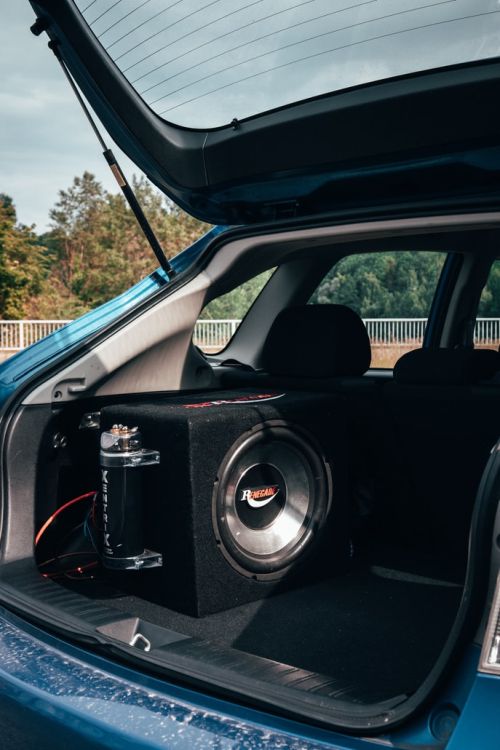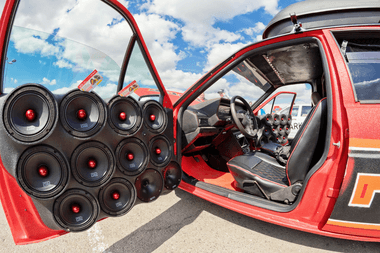Why Is My Subwoofer Not Hitting Hard & Other Subwoofer Problems
Subwoofer bass problems got you down?
Feeling puzzled asking yourself, “Why is my subwoofer not hitting hard?” We’ve all been in that spot, ready for a car jam session, but the bass just isn’t hitting. Don’t sweat it, we’re here to solve those bass blues.
Forget stressing over subwoofers not hitting hard, it’s time to roll up our sleeves and get to work.
With over two decades of navigating the tangled world of car audio, I’ve seen it all. From the subwoofer not working properly to dealing with subwoofer amplifier problems, no bass issue is too big or small to fix. Trust me, once we diagnose your car’s subwoofer problems, your trips will be all about that bass.
Heads up: After diagnosing subwoofer problems, your ordinary grocery runs might turn into unexpected tailgate parties!
So, let’s get started. Let’s solve that subwoofer low volume problem and improve your subwoofer performance.
Let’s make your subs hit harder!
[lwptoc]
Reasons Why Your Subwoofer Is Not Hitting Hard Enough
The function of subwoofers is to emit low-frequency sounds. These make the bass tones rich and enhance the overall quality of the sound.
Subwoofers play only when there are low-frequency sounds in the audio, they are silent when there are no low-frequency sounds. There can be many reasons for your subwoofer not hitting hard enough. Here are some of the most common issues:
- Muted Subwoofer: I know it’s obvious and it’s worth a shot
- No Low-Frequency Sounds: People expect to hear a thumping bass on every audio piece they play. However, low-frequency sounds like bass guitar or drums aren’t always playing.While checking your subwoofer, make sure you play a track with low-frequency sounds to find out if your subwoofer is working or not.
- Speaker Settings: Sometimes the subwoofer volume is not adjusted properly. Check the audio settings, if the bass subwoofer level is low, increase it according to your preferences.
- Wrong Frequency: Subwoofers are not independent devices. They work in configuration with the rest of the woofers. If all the speakers are not synchronized, the sound quality will be quite bad. Make sure that the frequency of your subwoofer is the same as your main speakers.
- Acoustics: Sometimes it may seem like your subwoofers are not hitting hard enough, but it is actually the acoustics of the room that are making your speakers sound bad.Home studios often have standing wave problems, which can soften the speakers no matter how good they are. Test the room acoustics before blaming your subwoofers.
- Source Configuration: This could be the cause of your problems if you are in a studio. Check the program sources like your microphone to find out if the problem is with them or the subwoofer. You can also connect your subwoofer to your phone or iPod. If the sound is fine, the problem lies with the source’s configuration.
- Wrong Amplifier: It is easy to tell if you have the wrong amplifier size. If your subwoofer sounds good when the volume is low, but does not hit hard enough when you increase the volume, your amplifier is too small.
- Motor Problems: This is not very common, but a weak subwoofer could be caused by a problem with the motor. The fuse or the battery could blow, damaging the motor.If you are sure that it is not any of the above causes, check if the motor is working correctly.
Why Does My Subwoofer Sound Weak?

Once you figure the cause out, it will become much easier to solve the problem.
1. Motor Issues
There might be issues with the motor itself that might be causing the subwoofer to sound weak. In case there are any faults within the battery or the fuse, then this issue is likely to spread to other components of the vehicle, including the motor.
This can then lead to small faults or a failure in an extreme case. Either way, these motor-related issues could certainly affect the subwoofer as well, causing it to produce a weak or distorted sound.
Make sure you check the motor to ensure that it is working smoothly. If not, you will need to take your car to a mechanic.
2. Low Frequency Output
It is important to keep in mind that the subwoofer itself is meant to enhance those parts of the music or song that have low frequency, adding to an improved thrumming effect while you are listening to the song.
While this might sound obvious, it is important for you to ensure that the music you are playing has such low frequency output in the first place. If it does not, the subwoofer is unlikely to enhance the song that you are playing.
Of course, if you keep playing music that contains low-frequency output and the subwoofer still does not end up catching them, then you will need to determine and fix the issue.
3. System Settings
It is possible that the settings in your sound system, including the subwoofer, might not be favorable enough for the subwoofer, causing it to produce weaker sounds.
In such a case, you will need to check and adjust the settings of all the components.
For example, if the settings of your speakers are not in sync with the settings of the subwoofer, then this could lead to a clash in frequency levels. This can lead to distorted or weak audio.
There might also be issues with the volume of the subwoofer, bass knob or the volume level of other parts of the system, such as the head unit. There might be issues or incorrect settings on the receiver as well.
If you have an amplifier, make sure you check that all its settings are favorable enough and in tune with the subwoofer so that they can work properly together without affecting the sound quality.
4. Underpowered Subwoofer
If you are not providing sufficient power inputs to the subwoofer, then this could definitely cause it to produce weaker sounds than its usual capacity.
Make sure you do not connect the subwoofer with an amplifier that is already strained and worn out as this could lead to distorted sounds, damaging the audio quality even more.
You will need to figure out the right crossover settings when it comes to the kind of speaker you are using to ensure that the power levels are appropriate.
5. Acoustics and Configurations
Quite simply, the issue might not have much to do with your subwoofer at all. If your subwoofer is in a room, then it is possible that the acoustics of that room might not work well to support the sound system.
There might also be poor configurations in terms of the device or source that you are playing the music from.
In your car, if you have placed your subwoofer in a cramped space that does not have enough ventilation, then this could lead to a weak sound as well.
6. Connections
You should check that all the connections to and from the subwoofer are in place since weak connections can lead to weak sounds.
It can help to disconnect and reconnect some of the cables and then test out the subwoofer sound again at different volumes and songs.
You might also need to check the wiring near the main unit, the converter (if any), and the battery.
Make sure none of the wires are burnt, broken, leaking or corroded, as this could lead to poor sound quality as well. Repair or replace these wires on time to prevent further damage.
How to Make Your Subwoofer Hit Harder
Here’s what you can do to make your subwoofer hit harder:
- Make sure you are using the correct amplifier for your car audio subwoofer. Amplifiers have different power outputs, you need to find the one that matches your subwoofer. Your subwoofer will hit harder with the correct amplifier.
- Get a bandpass box. Bandpass boxes are used to maximize the sound output of subwoofers. They don’t work with every subwoofer, so make sure to do your research before you buy one. The user manual of your subwoofer will probably tell you if it is compatible with a bandpass box.
- Tweak the settings on your amplifier and stereo unit. Adjusting these settings will improve the overall quality of the sound. If you figure out the right settings, you could make your subwoofer hit harder.
- Before you try to change the settings or buy bandpass boxes, make sure the problem is with the subwoofer itself. Play audio with low-frequency sounds like thumping noises or bass guitars. Listen carefully and feel the woofer. If you are able to feel the vibrations of the low-frequency sounds, your subwoofer is working fine. It may not be hitting hard enough because of the acoustics or the amplifier.
How to Tell When a Subwoofer Is Bad?
It can be a bit difficult to tell when a subwoofer is bad while buying it or even once you start using it. Apart from the sound quality itself being weak, you should also look out for some other criteria when it comes to this unit.
For instance, make sure that the subwoofer is made from sturdy and durable material and has a good warranty policy in place. Make sure you examine the subwoofer from all sides before buying it and enquire about a test run.
Once you start using it, in case you notice any issues with the components of the subwoofer such as the cone or the coil, then this could indicate damage as well. Make sure you do not spill or drop anything on your subwoofer either.
In case you notice any damage on it through these methods, then you will need to try to repair the issue or call a professional.
How to Make the Subwoofer Sound Better?
Now that you have determined the causes behind your subwoofer sounding weak, how can you make it sound better? Let’s take a look at some ways.
- Do not overwhelm your subwoofer or rely too much on other components to make up for its weak sound. Make sure the volume levels of all the components can work well enough with the subwoofer.
- You can try buying a high-quality device or purifier for your subwoofer so that it can enhance the sound quality. You can also make use of phase shifters that can minimize other unnecessary sounds.
- You should try to repair the issue as soon as possible, either on your own (if you are skilled and confident enough) or by calling a professional. You might need to replace the components, fix the wiring or replace the entire subwoofer itself.
Related: Loudest shallow mount subwoofer (with buying guides)
Overview of subwoofer problems, their possible causes, and proposed solutions
| Subwoofer Problems | Possible Causes | Solutions |
|---|---|---|
| Not Hitting Hard Enough | Muted Subwoofer, No Low-Frequency Sounds, Incorrect Speaker Settings, Wrong Frequency, Poor Room Acoustics, Incorrect Source Configuration, Wrong Amplifier, Motor Problems | Check if the subwoofer is muted, test with a track that has low-frequency sounds, adjust speaker settings, synchronize frequencies, assess room acoustics, check source configuration, get the right amplifier, check motor function |
| Sounding Weak | Motor Issues, Low Frequency Output, Incorrect System Settings, Underpowered Subwoofer, Poor Acoustics and Configurations, Bad Connections | Check the motor, ensure you’re playing music with low frequency output, adjust system settings, power subwoofer sufficiently, check room or vehicle acoustics and device configurations, ensure connections are solid |
| Need to Hit Harder | Incorrect Amplifier, Lack of Bandpass Box, Unoptimized Settings, Acoustics or Amplifier Issues | Use the correct amplifier, consider a bandpass box, tweak amplifier and stereo settings, check acoustics and amplifier functionality |
Conclusions on Subwoofer Bass Problems
Subwoofers can greatly enhance the sound quality and transform your listening experience. Whether you are a professional using them in your studio or an amateur using them in your car or home, you will appreciate the difference they make.
It is important you understand the technicalities of operating a subwoofer. Even studying the manual will give you enough knowledge to handle your sound system well.
Maybe you can help me out with something. Can you please share on social media how this article helped you? It would mean a lot for me. Thank You!
Roger and Out.
FAQ for Why is My Subwoofer Not Hitting Hard
Why Does My Subwoofer Sound Weak?
There are many things that could cause your subwoofer to sound weak. First, make sure that the problem lies with your subwoofer by testing it with a track full of low-frequency sounds.
If you are sure that the subwoofer is malfunctioning, check the amplifier next. Having the wrong amplifier size is the most common reason for subwoofers sounding weak.
Next, check the subwoofer volume in the speaker settings and if the subwoofer is on the correct frequency. Examine the configuration of the program sources too.
Lastly, it could be that your subwoofer is sounding weak due to a faulty motor. This is not very common, but sometimes a blown fuse causes a failure in the motor. Your subwoofer is most probably sounding weak due to one of the above reasons.
You may also be interested in: Top heavy bass subwoofer reviews article
How Do I Make My Subs Hit the Hardest?
There are many ways to make your subwoofer hit harder. One of the most popular ways is to add filters or phase shifters to your subwoofer.
You can also make minor upgrades to your subwoofer to make it hit harder. Change the small cone in front of the subwoofer, change the voice coil or get a new enclosure for the subwoofer.
If you don’t want to put much effort into it, just turn the volume to zero and play your track with medium bass. Now increase the main unit’s volume almost to its maximum. Increase the gain to the maximum level. The subwoofer will start to contort.
Now slightly decrease the gain until the distortion is gone. As long as your subwoofer is configured and installed correctly, this will make your subwoofer hit harder.
Debugging the problem with the weak subwoofer step by step
First you have to check the head unit to see the sound output and if the sound is weak if so you need to tweak the audio settings. Next thing to check is the bandpass box with the amplifier and stereo unit to check the sound output. So you need to check if the amplifier and stereo unit has enough power to play music. If you have a home setup then check the room acoustics and the bandpass box. In many cases the bandpass box could be the culprit.
How Do I Fix a Low Subwoofer Sound?
You can try fixing a low subwoofer sound by trying to change the volume or other settings. A protect or night mode might also be causing the issue, so make sure you turn those off.
If the issue is bigger, you will need to get it fixed as soon as possible.
What Does a Blown Subwoofer Sound Like?
A blown subwoofer could affect the sound quality significantly. If this is the case, the subwoofer will produce weak, cracking, popping, flat, static-like or distorted sounds. You can test this out at different volumes to check if this is the issue.
Accordingly, you will need to repair or replace the subwoofer.
What makes a subwoofer hit harder?
There are many ways to make your subwoofer hit harder. One of the most popular ways is to add filters or phase shifters to your subwoofer. You can also make minor upgrades to your subwoofer to make it hit harder. Change the small cone in front of the subwoofer, change the voice coil or get a new enclosure for the subwoofer.
You may also like: 10 best car subwoofer in the world
What are the most common car subwoofer low volume problems?
The most common car subwoofer low volume problems:
- Motor issues
- Low-frequency output
- Underpowered subwoofer
- Weak connections
- Weak acoustics
- Unfavorable system settings
My subs don’t hit hard. What should I do?
If your subs don’t hit hard or you’re not sure what’s wrong, try troubleshooting.
Most of the time, a subwoofer system isn’t powerful enough to play at high volumes and produce good bass response. If this is the case, you can get an amplifier or add more speakers and wiring to your setup.
Why does my subwoofer hit hard then soft?
There are many reasons why your subwoofer hits hard than soft. One of the most common reasons is that your amplifier is clipping when it plays bass at high volumes.
You might also have a system setting interfering with the performance of the speakers. If this is the case, you can try to change settings until you get better sound quality.
My subwoofer is quiet. What should I do?
If your subwoofer is quiet, you probably have two options. Try using a different head unit or amplifier to see if the issue gets fixed. If this doesn’t work, get a new subwoofer and check all connections.
Why is my subwoofer not hitting high bass?
One of the most common reasons why your subwoofer isn’t hitting high bass is that you’re not giving it enough power. Other possible issues: The head unit might be faulty, or you have a grounding issue.
Why is my subwoofer not hitting hard?
Subwoofers may not hit hard due to a variety of reasons such as muted settings, no low frequency sounds playing, wrong frequency or amplifying settings, poor room acoustics, audio system configuration issues, and underpowered subwoofers. Make sure you test the volume and frequency settings to diagnose the problem properly.
How are my subs not hitting hard?
To make your subwoofers hit harder you need to ensure that it has enough power output by using the correct amplifier for it and using a bandpass box if needed. You should also tweak all the settings on your amplifier and stereo unit as well as check for any wiring or battery issues.
How can I tell when a subwoofer is bad?
When determining whether a subwoofer is bad or not you should look out for things like sturdy material used in its construction along with a good warranty policy; any damage on its components such as cone or coil; spillage or dropping of items on it; a sound quality that becomes weak etc. If you notice any of these factors then you should repair or replace your subwoofer accordingly.
Subwoofer not as loud as it used to be. How do I make the Subwoofer sound better?
To make your subwoofer sound better ensure that it’s not overwhelmed by other components and get an audio purifier if needed to enhance its performance. You could also add phase shifters which will help minimize unnecessary sounds while trying to repair broken parts quickly by replacing damaged wires, components or even the entire setup itself if necessary based on a technical diagnosis of audio system configurations like relative polarity.
Last Updated on October 23, 2023 by Brian Beasley




